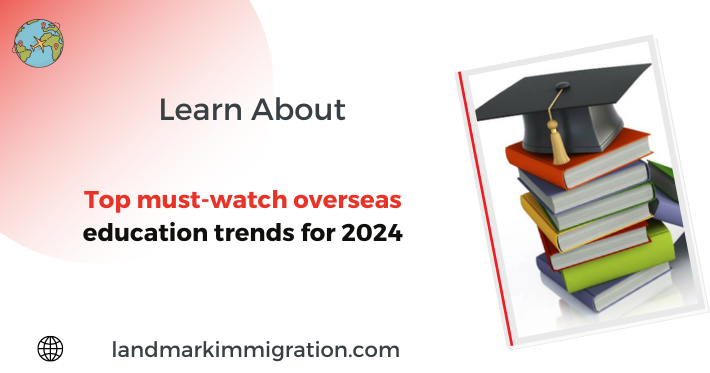
24 February 2024
As we enter 2024, the realm of global education is undergoing a notable evolution. The aftermath of the pandemic has significantly altered students’ perspectives on studying abroad. Shifting geopolitical landscapes, evolving visa regulations, and the emergence of new technologies are all key influencers in this transformation. Take a look!
International Education Trends for 2024
Unanimously Preferred Locations
Countries such as Ireland, Germany, and the United Arab Emirates are rising in popularity as favoured destinations. This trend towards diversification is fueled by a range of factors, including the quality of education, prospects for post-study employment, and visa policies conducive to students.
Hybrid Learning
The fusion of technology into education, accelerated by the pandemic, persists in shaping trends in studying abroad. Universities are progressively introducing hybrid programs, combining online and traditional classroom experiences. This method not only offers adaptability but also enhances the accessibility of international education. Moreover, virtual reality (VR) and augmented reality (AR) are poised to assume greater importance in providing immersive educational opportunities for students abroad.
Boost of Career-Oriented Courses
In 2024, there is a noticeable trend among students leaning towards programs with strong career potential. Disciplines such as Business and Management, Computer Science, Technology and IT, and Health and Life Sciences are especially favoured by international students.
Within this landscape, the US stands out as an appealing choice, leveraging its reputation for technological innovation. This attractiveness is further enhanced by investment avenues like the EB-5 visa, which offers not only academic advantages but also broader opportunities.
Policy Changes
Visa policies and governmental regulations in study-abroad destinations play pivotal roles in shaping student decisions. Take, for instance, the UK’s recent limitation on dependents for the majority of international students, excluding those enrolled in advanced research programs. This measure notably affects students who prioritize family considerations when choosing their study destination.
Increased Interest from Small Cities
In 2024, a notable trend is the growing enthusiasm for studying abroad seen in Tier 2 and 3 cities, notably in countries like India. This shift signifies a widening pool of international students, propelled by heightened awareness, improved access to resources, and expanded scholarship opportunities.
Sustainable Learning
Sustainability and social responsibility are emerging as focal points in international education. Universities are integrating these principles into their curricula, urging students to address global issues such as climate change and social inequality.
Scholarships & Financial Planning
As the expenses associated with studying abroad continue to climb, there’s a growing emphasis on financial planning and scholarship opportunities. Students and parents are actively exploring diverse financing avenues, ranging from educational loans to grants and scholarships. Meanwhile, universities are stepping up their efforts to provide financial aid and scholarships, aiming to attract a diverse student population.
Post-Study Work Opportunities
Nations that provide opportunities for post-study employment and avenues for potential residency are in high demand, offering students valuable practical experience and a solid foundation to launch their careers.
Mentorship Programs & Alumni Networks
The significance of alumni networks and mentorship programs in assisting international students is increasingly evident. These networks not only assist students in acclimating to a new academic setting but also play a vital role in their career advancement and networking opportunities.
More Trends Based on Surveys
Based on the GMAC Prospective Students Survey 2023 Report,
- there has been a notable shift in preference towards one-year MBA programs over traditional two-year ones, though full-time MBAs remain in high demand.
- Millennials exhibit a stronger inclination towards management-focused curricula compared to Gen Z candidates.
- there is a growing interest among students in courses centred around sustainable principles.
In light of these trends, Clark University’s MBA in Social Change & Sustainability and Haaga-Helia’s MBA in Leading Business Transformation emerge as sensible choices.
- The favoured choices among Indian students predominantly fall under STEM courses.
- The rise of metaverse, blockchain, and other AI-driven technologies such as ChatGPT and machine learning (ML) is capturing significant attention among Indian students.
In this context, destinations like Ireland, while hosting fewer universities, stand out as recognized hubs for global IT firms in Europe, presenting a distinct advantage.
The demand for healthcare professionals has surged overseas, notably in countries like Canada and Australia. Consequently, there has been a noticeable rise in student interest in health and medicine courses over the past year, a trend expected to persist in the coming year.
Moreover, global observations indicate that students are increasingly opting to enhance their competitiveness in the job market by pursuing industry-specific micro-credential course certificates alongside their regular degrees. This strategy is likely to continue as students seek to distinguish themselves in a competitive employment landscape.
In a recent QS survey, it was revealed that over 60% of students regard mental health support and counselling as essential components of university services.
Recognizing the potential cultural adjustment challenges students face when studying abroad, universities are placing greater emphasis on mental health support services. Foreign institutions are proactively addressing students’ well-being by offering resources, workshops, and counselling to help them navigate the stress of adapting to a new academic environment and culture.
This commitment to mental health support is expected to continue expanding in 2024. Indian students can anticipate foreign universities’ continued efforts to ensure their holistic well-being throughout their academic journeys.
Conclusion
There you have it, these trends in 2024 will bring about massive changes in the world of academia for international students. Are you ready to embark on this new-age journey? Contact Landmark Immigration for all your queries and concerns.




